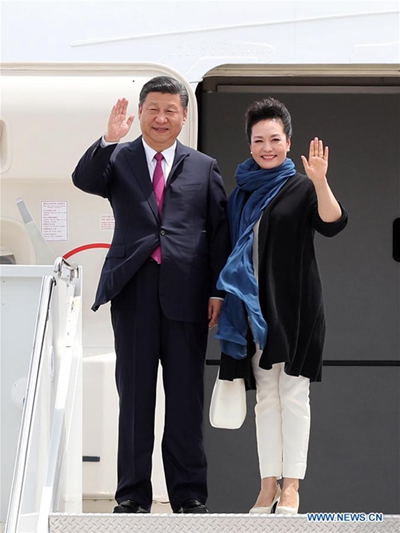President Xi in Florida - managing a difficult relationship
- By Tim Collard
 0 Comment(s)
0 Comment(s) Print
Print E-mail China.org.cn, April 7, 2017
E-mail China.org.cn, April 7, 2017
|
|
|
Chinese President Xi Jinping and his wife Peng Liyuan arrive at Palm Beach International Airport in Florida, the United States, April 6, 2017. Xi arrived here for the first meeting with U.S. President Donald Trump. [Xinhua/Liu Weibing] |
The first U.S.-China summit of the new Trump administration takes place at President Trump's preferred venue, his own resort of Mar-a-Lago in Florida. The principal topics are security and trade; more importantly, however, the two leaders will be seizing the opportunity to take each other's measure as they plot a course for the relationship over the next few years.
The global security environment has been rendered particularly unstable in recent months. China has tried to combine restraint in her military build-up - as evinced by the announcement earlier this year that the rise in military expenditure will be limited to 7 percent, not even a quarter of the proposed American budget - with a determination to maintain her core security interests in the East Asian region, particularly the East and South China Seas.
However, it seems that the U.S. has decided to raise the stakes on the Korean Peninsula, basing the THAAD missile defence system in the Republic of Korea, amid indications that Trump has grown impatient with the continuing stand-off regarding the DPRK's nuclear ambitions and appears to be threatening unilateral action.
Obviously, any threat of military conflict on China's borders is a matter of deep concern. President Xi will certainly be looking to defuse that threat.
At the same time, President Trump has called into question the traditional American commitment to active maintenance of the post-World War II alliance system in the Asia-Pacific region.
The sabre-rattling over the DPRK seems to suggest no serious American withdrawal - but it must have caused uncertainties among regional allies such as the ROK and Japan. Trump's demonstrative withdrawal from the planned trade-focused Trans-Pacific Partnership will certainly has that effect.
A further issue is the allegation that the Syrian government is using chemical weapons against its civilian population in the civil war festering since 2011.
Until now, the U.S. administration had been prepared to work with other members of the UN Security Council - notably Russia - and the Syrian government itself to bring about a solution to the crisis. Now, the American position has been reversed, a matter of great concern to China as a Permanent Member of the UNSC.
On trade matters, President Xi will be aiming to change the current American populist narrative that China is somehow to blame for America's economic and employment problems, and that cooperation offers far better prospects than confrontation.
Yes, China has a large trade surplus, but much of that is generated by American companies operating in China. Chinese statistics suggest that bilateral trade and investment are creating something like 2.6 million American jobs each year (2015 figures).
After years of American criticism of China for restricting trade through protectionist measures, it is perhaps ironic to see China now figuring as the world's flagbearer for globalisation and free trade, while America is tempted to retreat into protectionism and defiant mercantilism. Certainly, China will stick to her guns.
The world is hoping that the Florida meeting will concentrate the Trump's mind and bring a sense of realism to the formulation of American policy. In particular, President Xi attaches great importance to the agreement reached on climate change in Paris with former President Obama.
Trump, as part of his campaign rhetoric, denounced this agreement and even described climate change as a hoax perpetrated by China. The Chinese president will certainly hope to salvage this agreement, a real achievement of the present decade.
The meetings will certainly be low-key - there has been too much noisy rhetoric already - as neither country will benefit from flag-waving. In fact, the world's two greatest powers will have to get down to the hard, detailed work of mapping out a path for future cooperation; both nations have enormous scope to profit from economic relations, and the whole world requires them to work together in the interests of global security.
It is clear that the Chinese president is not seeking confrontation. It is important that this first meeting concludes with no sign of public conflict, and that at least a basic framework is laid out for constructive dialogue and a mutual commitment to stability.
It is probable that not much more is feasible at this stage. But an initial exchange in which both sides are seen to hold each other in respect will lay the foundations for practical improvements in the future relationships.
Tim Collard is a columnist with China.org.cn. For more information please visit:
http://www.ccgp-fushun.com/opinion/timcollard.htm
Opinion articles reflect the views of their authors, not necessarily those of China.org.cn.






